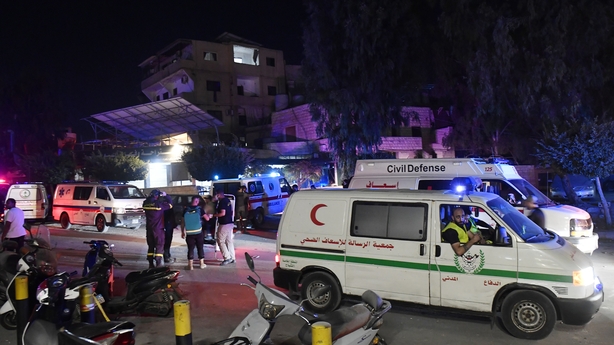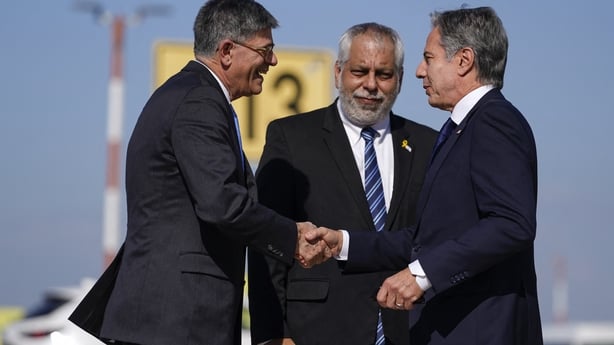The United Nations rights chief has said he is "appalled" by a deadly Israeli strike near a south Beirut hospital, demanding a "prompt and thorough investigation".
Lebanon's health ministry said that at least 18 people had been killed in the Israeli strike near the Rafic Hariri Hospital, the country's biggest public health facility, located a few kilometres from the city centre.
"I am appalled," United Nations High Commissioner for Human Rights Volker Turk said in a statement, insisting that "the fundamental principles of international humanitarian law concerning the protection of civilians must be respected".
He pointed out that four children reportedly figured among the at least 18 people killed, while 60 people had been wounded.

Rescuers are searching for survivors, amid fears that the toll may rise further.
The facility in the densely-populated Jnah neighbourhood sustained minor damage in the strike, with windows shattered and its solar panels destroyed, its director said.
In the vicinity, four buildings were flattened by the strikes, said an AFP correspondent in the area.
Mr Turk stressed that "in the conduct of military operations, all feasible precautions must be taken to avoid, and in any event to minimise, incidental loss of civilian life, injury to civilians and damage to civilian objects".
He said: "Hospitals, ambulances and medical personnel are specifically protected under international humanitarian law because of their lifesaving function for the wounded and the sick.
"When conducting military operations in the vicinity of hospitals, parties to the conflict must assess the expected impact on healthcare services in relation to the principles of proportionality and precautions."
The UN rights chief insisted that "any incidents which affect hospitals must be subjected to a prompt and thorough investigation".
"I repeat the UN's call for an immediate cessation to hostilities, and remind all parties that the protection of civilians must be the absolute top priority," Mr Turk added.

After nearly a year of war in Gaza, Israel shifted its focus to Lebanon, vowing to secure its northern border to allow tens of thousands of Israelis displaced by the cross-border fire to return to their homes.
Israel ramped up its air strikes on Hezbollah strongholds around the country and on September 30 sent in ground troops, in a war that has killed at least 1,550 people since 23 September, according to an AFP tally of Lebanese health ministry figures.
Earlier, Hezbollah said it had launched volleys of rockets at two key bases near Tel Aviv and a naval base west of Haifa, with US Secretary of State Antony Blinken arriving in Israel to begin another push for an ceasefire.
Diplomatic efforts have thus far failed to bring an end to the year-long Gaza war and its spillover conflict between the Lebanese armed group Hezbollah and Israel, which has dramatically intensified in recent weeks after a year of exchanging fire mostly across Lebanon's southern border.
After a heavy night of Israeli strikes on Lebanon's south and the southern suburbs of its capital, Hezbollah said it had fired rockets at the Glilot base used by Unit 8200 of Israel's military intelligence, and the Nirit area in Tel Aviv's suburbs.
The group said it also fired rockets at a naval base outside of the port city of Haifa further north.
There were no immediate reports of casualties. Israeli authorities said air sirens were activated in areas southeast of Tel Aviv due to one projectile identified crossing from Lebanon and falling in an open area. Other sirens sounded in Tel Aviv.
🚨Sirens sounding in central and northern Israel🚨
— Israel Defense Forces (@IDF) October 22, 2024
Israel's multi-layered air defences have intercepted the vast majority of missiles and drones fired at it since the start of the Gaza war.
Meanwhile, Israeli Prime Minister Benjamin Netanyahu, meeting with US Secretary of State Antony Blinken, said there was a need for a security and political change in Lebanon that would allow displaced Israelis to return safely to their homes.
Mr Netanyahu met with Mr Blinken for 2-and-a-half hours today and the meeting was friendly and productive, according to a statement from the prime minister's office.
Mr Netanyahu also said Israel was working hard to bring back hostages still held in Gaza and that the elimination of Hamas leader Yahya Sinwar "may have a positive effect on the return of the hostages, the achievement of all the goals of the war, and the day after the war".
Mr Blinken's trip to the region is his 11th since the attack on Israel by Hamas on 7 October 2023, that triggered the Gaza war. It comes as Israel intensifies its military campaign against Iran-backed militants - Hamas in Gaza and Hezbollah in Lebanon.
Mr Blinken was also due to discuss Israel's retaliation for Iran's 1 October ballistic missile attack, said a senior US State Department official, speaking on condition of anonymity.
A retaliation could disrupt oil markets and risks igniting a full-blown war between Iran and Israel.

